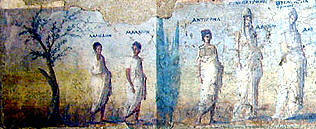

 |
Latin 201 |
 |
| The Worlds of Roman Women: Internet Resources | ||
| Home | Assignments | Syllabus | Wheelock's Latin | Roman Women | Internet Resources | UNCW | CS Minor |
UVic Latin Exercises: An excellent site for checking your expertise. I will often link these to our grammar and review pages, or for our review materials, you can go there yourself and try the exercises that are most needed for your own development.
Latin Grammar Exercises by Ilaria Marchesi: Another good site for online checking of your grammar skills, organized to align with Wheelock's grammar.
Latin Praxis: Another Wheelock-focused exercise site, which offers some interesting exercises and resources, including a "vocabulary mapping" system for Wheelock's Latin Grammar.
Grammar Review pages for 101-102: This can be a good resource for things you know but are rusty on or would like to see explained again -- it has more explanations and examples than some of the other sites.
Latin Dictionary Look-Up Tool: This excellent resource allows you to look up words in Latin and to translate English to Latin as well. You just enter the stem plus ending, or dictionary form, of the word in question, and it gives you either a single entry or, if the stem could be more than one thing, a list of possible words and their meanings in Latin from which you will probably be able to pick the right one.
William Whittaker's Words: This program will give you every possibility for the word you enter -- including the grammatical elements (for example, gender, number and case). If you are grammatically inclined, use this! But if you find all this information daunting in chart form, stick to the Look-Up Tool.
Fundamental Vocabulary from the Irish NCCA: A great and very useful list of the 600 most common and fundamental vocabulary words in Latin, compiled by the Classical Association of Ireland for use in studying for comprehensive tests. Since we all come from different backgrounds and programs, I will try to stick with this list in exercises (except where the specific language of our readings diverges from it) so we'll all be on (more or less) the same page. Print it out; you might want to highlight words learned or words you are working on.
Basic Latin Vocabulary: This interesting site provides you with the 1500 most common words in Latin, that make up more than 85% of the words you will ever see in reading. Admittedly, 1500 sounds like a lot. On the other hand, the section is interestingly divided into categories such as "feelings," "mind," "animals," etc. If you want to continue in Latin, or if you are just curious about the most significant topics and ideas in Latin, give it a try.
200 Most Common Latin Words: Just what it says it is. It lists the 200 words that make up 50% of the average prose text. The words are helpfully grouped by type (noun, adjective, verb, etc.) -- the only problem is, it doesn't define them, leaving that up to you. But it is very useful anyway.
Basic Latin Vocabulary: A list, word by word, of the most common words in Latin from the most common down -- very instructive. But again, no definitions.
Odi et Amo: A very amusing "Ancient Roman Radio Show" featuring an interview with the "real Lesbia" -- you'll find many quotes from the poems of Catullus worked into this "interview," and it's really pretty funny.